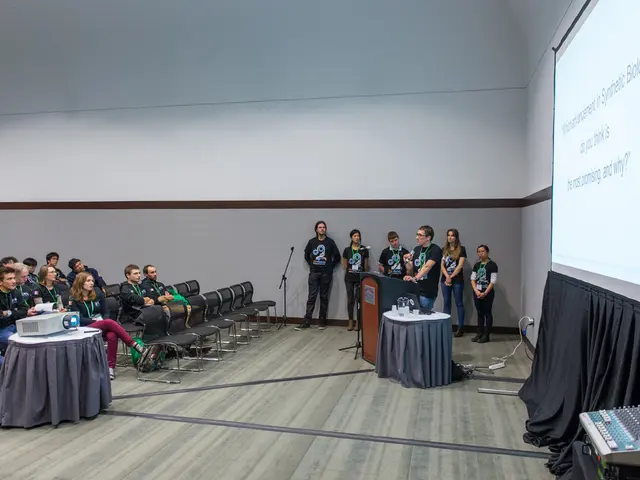AI's Impact on Software Development: Transforming the Landscape of Programming
In the dynamic world of technology, Artificial Intelligence (AI) is significantly reshaping the role of software developers. By automating routine and repetitive coding tasks, AI is enabling developers to focus more on creativity and complex problem-solving.
AI tools, such as code generators, automated testing, debugging assistants, and AI-powered pair programming systems, are now integral to software development workflows. According to recent statistics, 97.5% of companies have adopted AI technologies in this field.
This transformation presents new opportunities for developers. For instance, AI can increase productivity, with tools like GitHub Copilot enabling up to a 55% speed increase and improving code quality. AI also automates testing and debugging, helping detect bugs and fix issues more efficiently, reducing manual effort and time-to-market.
Moreover, AI-powered development environments are becoming more interactive, allowing programmers to work in natural language-driven interfaces. This shift enables developers to concentrate on high-level design, architecture, innovation, and creative solutions.
However, this shift also brings challenges. Ensuring transparency and ethical use of AI-generated code is a growing concern, as is maintaining architectural integrity and managing AI models responsibly, particularly around data privacy and security. Developers will need to adapt to new AI tools and workflows, which can initially be complex and require continuous learning.
As AI becomes more ingrained in software development, developers will need to shift from coding-centric roles to AI-curation roles, ensuring that AI-generated solutions are accurate, ethical, and aligned with project goals. Ensuring transparency, mitigating bias, and maintaining ethical AI practices will be essential.
AI can monitor API interactions to prevent unauthorized access, optimize software deployment, monitor system performance, and predict when infrastructure resources need to be scaled up or down in DevOps, CI/CD pipelines, and infrastructure management. AI can also detect anomalies in application behavior, identifying potential security breaches, and predict potential exploits.
In low-code and no-code platforms, AI helps users design interfaces, automate workflows, and optimize application logic with minimal human intervention. AI-generated code can have inherent security flaws or unethical behavior due to bias in AI models, making it crucial to verify its correctness and ensure ethical use.
Skills like critical thinking, adaptability, and public speaking confidence will become increasingly valuable for developers navigating collaborative and AI-driven environments. The relationship between developers and AI will evolve into a collaborative partnership, with AI acting as an intelligent coding assistant, suggesting code snippets, autocomplete functions, and generating entire classes or methods. AI can even generate code on its own, with tools like OpenAI's Codex writing entire applications from a simple text description.
In summary, AI is reshaping software development by transforming developers from sole coders into AI-augmented collaborators, offering substantial productivity gains and innovation potential while introducing important governance, maintenance, and ethical considerations that the industry must address.
Artificial Intelligence (AI) integration in software development has led to the utilization of AI-powered tools like code generators, automated testing, and debugging assistants, significantly impacting development workflows (tech, technology). The increasing adoption of AI technologies in this field, as indicated by recent statistics, signifies a shift towards AI-curation roles for developers (artificial-intelligence).




